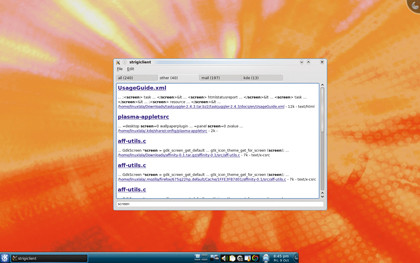6 of the top desktop search tools for Linux
Do desktop search tools spell the end of grep?
There's nothing to see here, folks
The fastest and smallest desktop search tool (as the Strigi developers claim) disappointed us, never once returning the correct search results for a query. Here's hoping that your mileage varies…
It can be installed easily enough from the software repositories of most distributions. Designed to be a graphical replacement for grep and find, its many shortcomings make Strigi our least favourite tool on this list.
You can launch Strigi using the strigiclient command or the Alt+F2 quick launcher. By default, it doesn't create an entry in any of the menus. It begins indexing the directories listed as soon as you click the Start Indexing button.

Depending on the number of files involved, the size of the index can be very large, so you might have to keep a careful watch on that number. When you're ready to use Strigi, begin typing into the text bar at the bottom of the window.
Matching results are displayed pretty much for each keystroke, so it does deserve the title of being the fastest search tool. But while Strigi claims to be able to search inside archives, all tests point to the contrary.
The biggest problem with Strigi is that it'll only show you the first 10 results for your query, so even if it finds 55 matching items, you can't browse this list. Being forced to refine your search so the file you want is listed in the first 10 matched items defies the entire premise of desktop search tools. Even command line noobs will probably have more luck using find and grep.
Sign up for breaking news, reviews, opinion, top tech deals, and more.
For a tool that racks up a 200MB index in half an hour without breaking a sweat, the fact that it can't find the file you're looking for is beyond baffling.
Verdict
Version: 0.6.3
Website: http://strigi.sourceforge.net
Price: Free under GPL
Not even usable enough to test the claims made on its website. Never shows any file you're looking for.
Rating: 1/10

Shashank Sharma is a trial lawyer in Delhi, India. Long before his foray into the world of litigation, he started his career by writing about Linux and open source software. Over the years, Shashank has also written various articles and reviews for TechRadar Pro, covering web hosting providers and website builder tools.